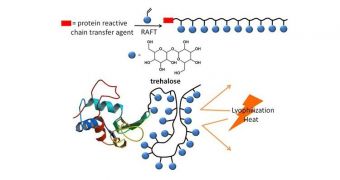During transport and storage, proteins are very prone to suffering degradation, or losing their active properties. Excipients such as polyethylene glycol are used to stabilize them, but experts now announce the development of special polymers that could do this more effectively.
The materials are capable of stabilizing proteins for longer periods, allowing them to retain their properties. This achievement could be very important for diabetics, who rely on insulin for their very survival. Most research labs in the world also use proteins as reagents.
Temperature fluctuations are one of the main culprits behind protein degradation. At this point, the small molecules need to be transported in controlled environments, which leads to high costs.
Now, investigators at the University of California in Los Angeles (UCLA) say that advanced polymers could fulfill the same stabilizing function as polyethylene glycol used to. Details of their approach appear in the latest issue of the Journal of the American Society of Chemistry (JACS).
The new polymers are made up of a polystyrene support structure, on which multiple chains of the disaccharide trehalose are attached. The sugar is found in a large number of animal and plant species that are capable of enduring prolonged periods of drought without dying.
The material was developed by a collaboration of researchers from the UCLA Department of Chemistry and Biochemistry and the California NanoSystems Institute (CNSI), also at UCLA.
“Our polymers were synthesized by a controlled radical polymerization technique called reversible addition-fragmentation chain transfer (RAFT) polymerization in order to have end groups that can attach to proteins to form what is called a protein-polymer conjugate,” Heather Maynard explains.
“We found that the polymers significantly stabilized the protein we used – lysozyme – better to lyophilization (freeze-drying, in which water is removed from the protein) and to heat than did the protein with no additives,” she goes on to say.
Maynard holds an appointment as an associate professor of chemistry and biochemistry at UCLA, and is also a member of the CNSI. She says that the use of trehalose on humans has already been approved by the US Food and Drug Administration (FDA), as part of therapies against certain forms of cancer.

 14 DAY TRIAL //
14 DAY TRIAL //